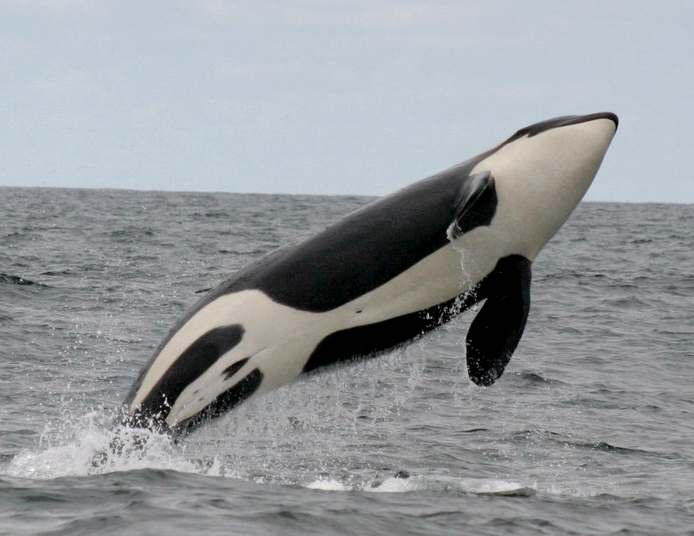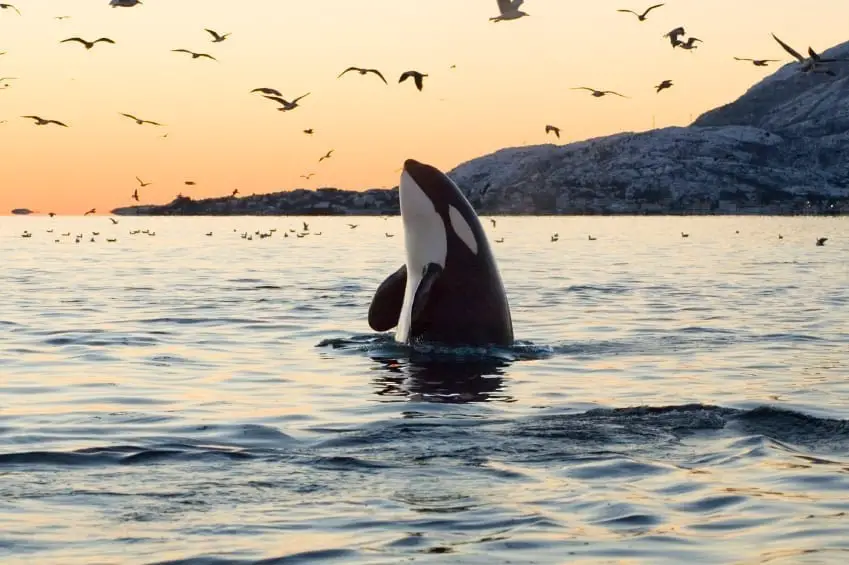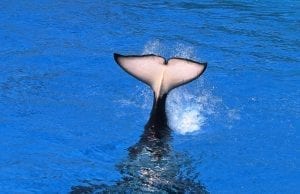What Do Killer Whales Eat?
Are Killer Whales Sharks?
The killer whale, or Orcinus orca, is one of the most beautiful animals in the world. A killer whale is a very large animal that can be more than fifteen feet in length upon maturity. The large dorsal fin on the whale is used to allow a whale to stabilize its movements. It can be up to six feet high for a male and four feet high for a female.
The birthing period for a killer whale can take a while. It will take sixteen months for a female to produce and give birth. After this the mother will nurse the newborn for a year. The teeth that a killer whale has for eating fish and various marine mammals are very large. A whale can have about forty to sixty teeth with these teeth being up to three inches long and one inch in diameter. These teeth will have a great deal of food each day because a whale can eat about five percent of its weight per day.
What Do Killer Whales Eat?
Today, whales are protected, even though they continue to be hunted in some nations. Gray whales are unique to the species since they are among the only whales that consistently eat from the base of the ocean. They have lungs they use to get the oxygen they need by breathing air (like humans). It is projected that sperm whales eat in excess of 220 billion lbs of squid each year. Toothed whales are known as active hunters because of the simple fact they possess teeth. The most frequently encountered whale watching boat here is a hard-sided inflatable raft which is capable of high speeds and gives a lot of exposure for guests to discover the wildlife.
One of the absolute most useful abilities whales use when hunting for food is called echolocation. It is normal for killer whale to swim through the water over 50 miles without stopping. The killer whale is owned by the family of dolphins and is the largest dolphin. Killer whales are known to use various sounds whenever the killer whales are participating in various pursuits. Adult killer whales are extremely distinctive and aren’t usually confused with any other sea creature.
Orcas are among the most versatile and fearsome predators on the planet, known to eat different kinds of sharks, seals and whales. An adult orca consumes 100-300 pounds of food per day, based on the animals size and energy requirements. Orcas are often referred to as killer whales. Orca eat a wide variety of foods like fish, squid, sea lions, walruses, seals, sharks and perhaps even massive whales and are thought to be on top of the food chain in the aquatic realm since they don’t have a real predators. Therefore, the orcas in a particular region can specialize in hunting and consumption of a specific prey.
Female Killer Whales
Killer whales are extremely sophisticated and productive predators of marine mammals. They have good eyesight above and below the water, excellent hearing, and a good sense of touch. Female killer whales start to mate between 14 and 15 decades old.
In some instances, a female may not have another calf for a decade. A youthful female is just loosely linked to the other members of her pod, because all of them have different fathers. Simply speaking, it suggests females may quit breeding early to assist their kids and grandchildren survive and reproduce. It might be that older females are more inclined to share, and younger females are less inclined to share food,” says Croft.
After the whale resurfaces, they need to release the used up air back in the atmosphere just enjoy the rest of the mammals do. It is normal for killer whale to swim over 50 miles without stopping. Killer whales are known to use unique sounds once the killer whales are participating in various pursuits. Adult killer whales are extremely distinctive and aren’t usually confused with any other sea creature.
The male whales are not going to breed with animals outside their group, Balcomb stated. Toothed whales locate their food utilizing echolocation. Baleen whales have a tendency to be solitary animals, traveling alone or in tiny groups. The bigger baleen whales have a tendency to prefer modest groups or traveling alone.
Mating, Birth, and Baby
Killer whales often quit reproducing when their living conditions aren’t favorable. They are a polygamous species, and they may have multiple partners in a single season. Male killer whales typically live for approximately 30 decades, but might live from 50 to 60 decades.
To provide each male the very best opportunity for reproducing some species produce large sums sperm that is thought to help wash out the preceding males sperm in an effort to impregnate the female whale with its own sperm. Though some whale species are known to migrate long distances there are quite a few species that inhibit exactly the same area throughout the year or adhere to the migration patterns of their food instead of searching for a perfect mating atmosphere. Other species like the killer whale are known to form lifelong bonds with their loved ones and friends and many generations of family members can be viewed together in one pod.
All 3 forms of killer whales share at least portion of a house range, yet they aren’t known to intermix with each other. They are the most widely distributed marine mammals, found in all parts of the oceans. Female killer whales start to mate between 14 and 15 decades old.
Whales use echolocation to locate their pray by sending echo waves and waiting for the sound to bounce back from the object. Killer whales can be found foraging for food, traveling around the water and resting by slowing down in the water.
June 9th – The T137s and T046s were seen in the late afternoon in Rosario Strait. See our FB page for more photos! pic.twitter.com/wYyFrDfVTM
— Killer Whale Project (@TKWResearch) June 12, 2015
All of these activities are generally done in groups. Interesting fact about killer whales is that female are the dominant figure in the pod and they usually outnumber males. Male whales average 30 years lifespan while females can live up to 80 years. Interestingly these killer moms have excellent baby sitting organization. The National Fish And Wildlife Foundation works on initiatives to preserve the population of killer whales.
New Killer Whale Discovered
Scientists in 2019 have studied and identified a new species of killer whales off the coast of Chile. This is known as the “type D” killer whale. More information on this development is found here.

Quotes: https://www.interestingfacts.org/category/quotes
Nature Facts: https://www.interestingfacts.org/category/nature-facts
World Facts: https://www.interestingfacts.org/category/world-facts
Science Facts: https://www.interestingfacts.org/category/science-facts
Definitions: https://www.interestingfacts.org/category/definition
Planets: https://www.interestingfacts.org/category/facts-about-planets
Nutrition Facts: https://www.interestingfacts.org/category/nutrition-facts
Information: https://www.google.com
Things To Do: https://www.seatsforeveryone.com/blog
Sitemap: https://www.interestingfacts.org/sitemap.xml
Seal narrowly escapes killer whale from nonononoyes
Man saves a baby killer whale’s life from aww
The Marine Mammal Research Organization provides consistent research on killer whales and other creatures.
Orca, or more commonly known as, the killer whale is a toothed whale belonging to the dolphin family. The word dolphin might make it seem like they’re calm, but if that’s the case, you’re definitely missing out on the killer part. Orca are apex predators, meaning that there isn’t a creature that could prey on them. Here everything you need to know about Killer Whales.
Appearance
A normal killer whale has a black body, white crest and a small white patch above and behind the eyes. They are born with an orange tone which later fades to white.
Their teeth are extremely strong. The upper teeth completely fall between the lower teeth when the mouth is closed and the back teeth hold the prey in place as the whale tears them apart.
Physically, they’re the biggest creature in the whale family. Males grow up to a range of 8 meters and weight 6 tons. Female are slightly smaller with a range of 7 meters and a weight of about 4 tons. The largest killer whale ever was recorded to be 9.8 meters and 10 tons.
Despite their enormous size, they are one of the fastest things in the ocean. They’re able to reach a speed of 56km/h making them the fastest marine mammals.
Source of Nutrition
Killer Whales are apex predators and are sometimes called the wolves in the sea because of their tendency to hunt in packs. They hunt a variety of different ocean life which includes fish, cephalopods, mammals, sea birds as well as sea turtles.
Life Span
The life span of killer whales are dramatically different when we’re talking about orcas in captivity and in the wild life. In the ocean, orcas can have a life span of up to 80 years. The oldest killer whale to live was a female that aged to 103 years. However, when we’re talking about whales in captivity, this number decreases significantly. Male captives only live 17 years and female only 29 years. This is the reason why there are petitions being signed all over the world to prohibit captivity of these creatures.
Habitat and Population
There’s not one specific region for killer whales, they’re found pretty much all over the world in all ocean and seas. They don’t really have a preference, but if we had to name one, it’d be that they prefer higher latitudes and coastal areas instead of pelagic environments. A few examples of such sites would be Iceland, Norway, Argentina, New Zealand and other parts of the west coast of North America from California to Alaska.
The exact worldwide population is hard to predict because of how spread out these whales are. But, a recent estimate suggested that there are at least 50,000 of these creatures around the world. 25,000 of them are around the Antarctic, 8,500 in the tropical Pacific, 2,250 in the northeast Pacific, 1500 in Norway and about 2000 in and around Japan.





